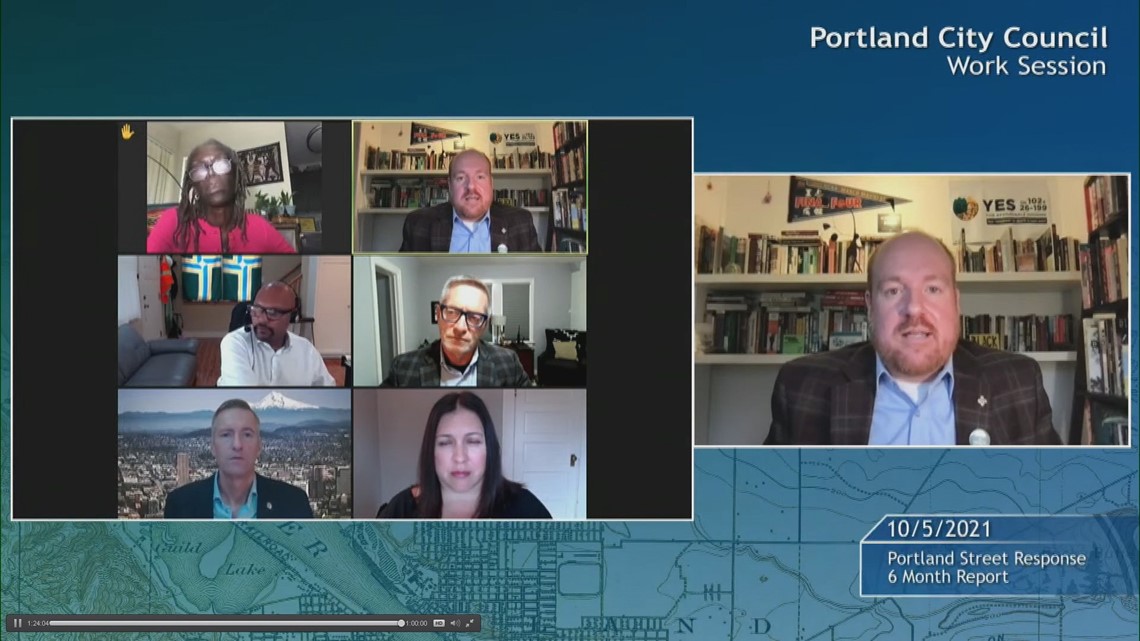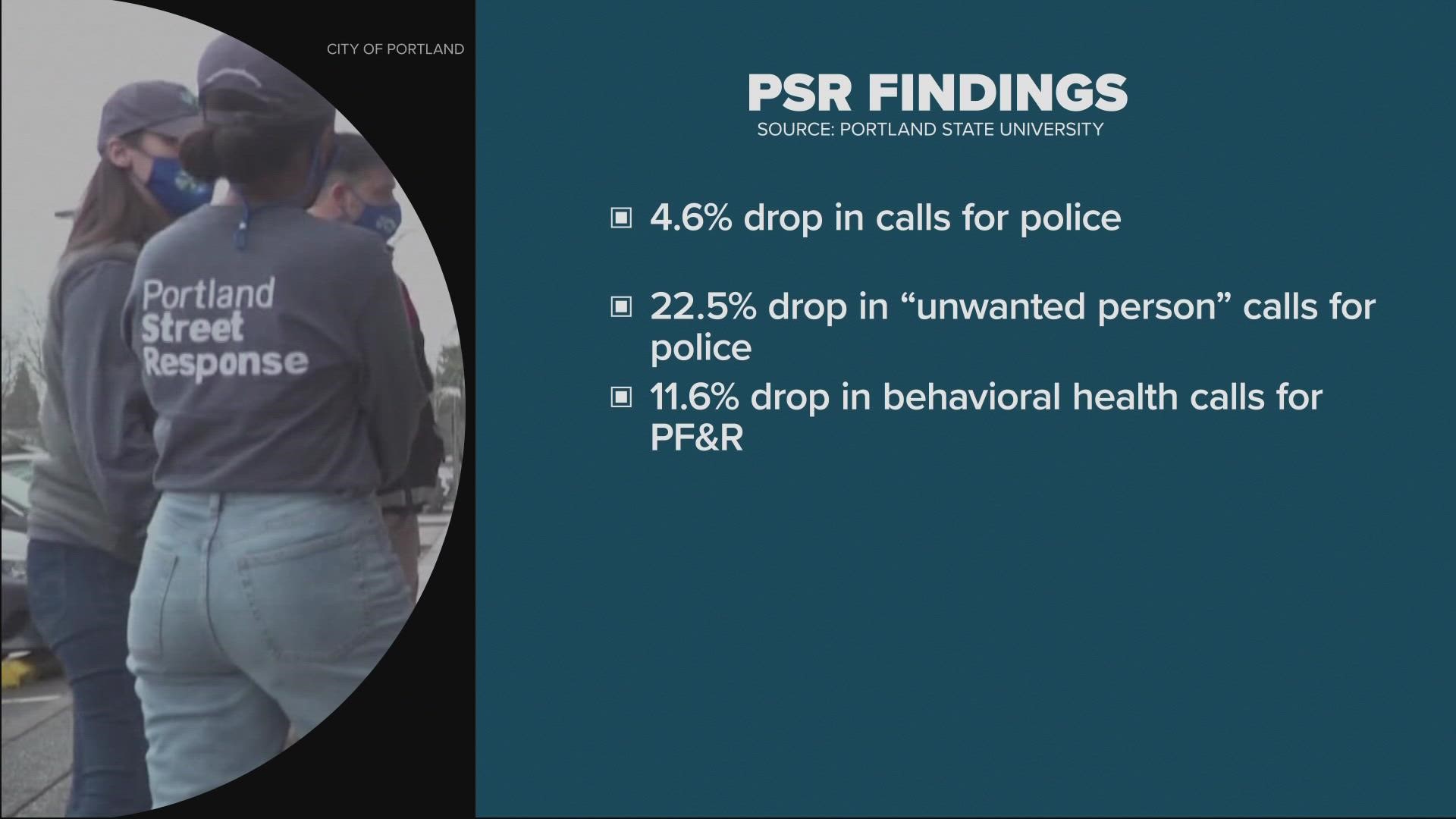PORTLAND, Ore. — Researchers with Portland State University contracted by the city of Portland to study the development, launch and progress of Portland Street Response gave a formal, data-driven recommendation Tuesday that the program be expanded citywide.
“Our first recommendation is to commit the necessary resources toward the expansion of Portland Street Response to eventually make its services available throughout the city and during all hours of the day,” said Dr. Greg Townley, director of research for the Homelessness Research & Action Collaborative at PSU, to city commissioners Tuesday. “This recommendation is based on our analysis of call data, as well as feedback from each stakeholder group we interviewed.”
Dr. Townley spoke to the council for roughly two hours Tuesday, taking questions from city commissioners about the PSU study.


In a press release provided to KGW, researchers laid out their key findings on the impacts of Portland Street Response, or PSR. Instead of police, PSR sends teams of crisis counselors and paramedics to non-violent calls involving mental health crises or addiction. It’s been operating as a limited pilot project in Southeast Portland since February.
Researchers, led by Townley, said PSR had the following impacts on the first response system in Southeast Portland, largely the Lents Neighborhood:
- 4.6% reduction in total calls traditionally responded to by police
- 22.5% reduction in police response on non-emergency welfare checks as well as dispatches coded as “unwanted persons” and “suspicious persons” calls
- 11.6% reduction in fire department activity on behavioral health calls and illegal burn calls
- Only 14 calls (3.7%) required transport to ER
- Clients rated PSR a 5 on a scale of 1 to 5, with 5 being the best
The presentation comes one day after Commissioner Jo Ann Hardesty told KGW she plans to introduce a roughly $1 million expansion package later this month, during the regular city budget adjustment process known as the “fall bump." As part of the proposal, she’ll ask council to formally commit to a citywide expansion of Portland Street Response, to take effect in March. The proposal would include hiring 13 full-time employees: four crisis medics, two mental health clinician I’s, two mental health clinician II’s, three community health workers and two peer support specialists.
Three out of her four fellow commissioners told KGW they support the expansion: Dan Ryan, Carmen Rubio and Mingus Mapps. Mayor Ted Wheeler said in a statement Monday he’s “supportive of the Portland Street Response program” and was working with Commissioner Hardesty to hammer out the details.
Tuesday, he had questions for Dr. Townley about what potential hitches in expanding the program.
“What concerns do you have? What should be keeping us awake at night when you think about this program?” the mayor asked, adding he worried the study might not be entirely objective, given that Dr. Townley had been using the word “we” when describing Portland Street Response.
Dr. Townley assured the mayor he and his researchers had indeed remained objective, adding his use of “we” was an unintentional repercussion of his years-long relationship with the program.
He laid out his concerns, citing conversations around how to grow PSR’s call volume. Data presented to the council last month indicated the teams were only responding to three to four calls per day. Staff at the time noted the lower call volume was the result of a number of factors: PSR can’t respond to calls where the subject has a weapon, they can’t go into homes or private businesses and they can’t respond to suicide calls.
As a result, some supporters have floated expanding the call criteria to include going into homes and businesses, which Dr. Townley said Tuesday he supports.
He noted, however, he remained cautious about another proposed tactic: co-responding to calls with Portland Police, a criteria that would have to be negotiated with the Portland Police Association. Dr. Townley said he believes that approach has its place, but he worries it will be overused.
“This is really supposed to be a program where it’s taking the police out of the response,” he said. “And so co-response is important, but I keep pushing that like … the program needs to retain its mission of being a non-police response, unless the call does escalate to a level where the team is unsafe, the client is unsafe.”
He added, in those cases, the team has “demonstrated an ability” to call police in for backup.
Commissioners did not vote or make any major decisions on the potential expansion at Tuesday’s work session. If they decide to move forward with Commissioner Hardesty’s proposal later this fall, the hiring of new PSR staff would start in January 2022. The new teams, working out of three vans, would fan out citywide in March.
The program, Hardesty’s staff noted, wouldn’t run 24/7. PSR teams would be available by calling 911 or the nonemergency line from 8 a.m. to 6 p.m. Monday through Thursday, and from 6 p.m. to 3 a.m. Thursday through Sunday.
Mayor Wheeler said Tuesday he plans to present his recommendations for the "fall bump" budget adjustment in a couple of weeks.

